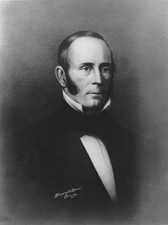James Semple
| James Semple | |
|---|---|
 | |
| United States Senator from Illinois | |
| In office 1843–1847 | |
| Preceded by | Samuel McRoberts |
| Succeeded by | Stephen A. Douglas |
| Personal details | |
| Born | January 5, 1798 Green County, Kentucky |
| Died | December 20, 1866 (aged 68) Elsah, Illinois |
| Political party | Democratic |
| Profession | Attorney, soldier, businessman |
| Military service | |
| Service/branch | Kentucky Militia United States Army |
| Battles/wars | Black Hawk War |
James Semple (January 5, 1798 – December 20, 1866) was a United States Senator from Illinois.
Born in Green County, Kentucky, he had some private education as well as public schooling before enlisting in the Army in 1814 and being an ensign in the Kentucky Militia in 1816. He moved to Edwardsville, Illinois, in 1818 and to Chariton, Missouri, in 1819. During the Black Hawk War of 1832, he served as an adjutant.[1]
Semple unsuccessfully ran for U.S. Senate in 1836. President Martin Van Buren appointed him as Chargé d'Affaires to New Granada on 14 October 1837, and he served in that capacity until 4 March 1842.
Semple was the judge of the Illinois Supreme Court from 1842 to 1843. He was appointed and subsequently elected as a Democrat to the United States Senate to fill the vacancy caused by the death of Samuel McRoberts and served from December 4, 1843, to March 3, 1847. He was not a candidate for renomination in 1846.
Semple ended up in Jersey County, Illinois, where in 1853 he founded the town of Elsah, Illinois. His son Eugene Semple was a politician in the territory and state of Washington.
James Semple died in Elsah, Illinois on December 20, 1866 and is buried in the Bellefontaine Cemetery, St. Louis, Missouri.
Notes
References
| United States Senate | ||
|---|---|---|
| Preceded by Samuel McRoberts |
U.S. Senator (Class 2) from Illinois 1843–1847 Served alongside: Sidney Breese |
Succeeded by Stephen A. Douglas |
| Diplomatic posts | ||
| Preceded by Robert B. McAfee |
United States Chargé d'Affaires, New Granada 21 April 1838–4 March 1842 |
Succeeded by William M. Blackford |
| ||||||||||
| |||||||
| ||||||||||||||||||||||||||||||||||||||||||
|

